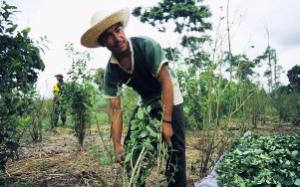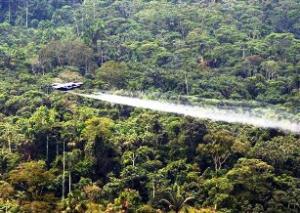Marking the end of an era, Colombian President Juan Manuel Santos Tuesday unveiled a new policy for dealing with coca cultivation and cocaine production, one that will rely on crop substitution and alternative development, with manual crop eradication only to be used as a last resort.

Colombia's years-long policy of attempting to eradicate coca crops by spraying fields with herbicides will be history at the end of this month. That policy was backed and financed by the United States as part of its multi-billion dollar effort to defeat drug trafficking and, later, to defeat the FARC.
Despite the billions spent, Colombia remains the world's largest coca and cocaine producer, according to the US government. While production is down from record levels early this century, it rose 39% last year to about 276,000 acres. Figures from the UN Office on Drugs and Crime show a lower extent of cultivation (170,000 acres), but echo that it is on the increase. According to UNODC, the increase was 44% last year.
The plan announced Tuesday, the Integrated Plan for Crop Substitution, has as its goals reducing the crime associated with the drug trade by reorienting policing efforts toward processing, trafficking, and money laundering -- not harassing peasants -- improving state capacity through the improvement of social, economic, and political conditions in the countryside, and dealing with drug consumption with a focus on human rights, public health, and human development.
It sets out six foci:
- Social Investment. That will include state and private spending on roads, energy supply, water supply, and investment in public health and education.
- Crop Substitution. A phased-in plan with community involvement that will create socio-economic stabilization and create new income opportunities. Agreements will be made with whole communities, not individual growers. Once a community has agreed to crop substitution, voluntary coca eradication will begin. If there is no agreement to eradicate, the government will do it manually, by force.
- Interdiction. Interdiction will continue, but in concert with the priorities of local communities and farmers. The plan also envisions "strengthening the legal tools available to fight the illegal drug business."
- Investigations and Prosecutions. The government will give top priority to going after "intermediate and top links of the drug trafficking chain," not peasant farmers.
- Prevention and Treatment. The new plan will emphasize youth prevention, as well as drug treatment using "programs founded on evidence." The plan calls for an increase in the quantity and quality of drug treatment offered.
- Institutional Reforms. The plan will create a new agency for alternative development in illicit cultivation zones. The agency will establish metrics for success, which will be made public on a regular basis.
The government's plan is in line with the recommendations of its Advisory Commission on Drug Policy in Colombia, which in a May report, called for drug policy to be based on evidence and the principles of public health, harm reduction and human rights, with effective state institutions to coordinate policy implementation. Combating the drug trade should focus on trafficking organizations and money laundering, and peasant coca growers should be offered alternative development, not criminal prosecution, the report also recommended. (The report and the issues it addressed were recently discussed at this Brookings Institution event.)

The plan will focus on the southern provinces of Narino and Putumayo, "where there are some 26,000 families that produce coca," Santos said. "Work will be done to construct roads, schools, health clinics, aqueducts and service networks," he added, noting that coca cultivation is most extensive in areas where the state is weakest.
While the government will seek agreements with communities to voluntarily eradicate their coca crops, "if an agreement is not reached, forced eradication will be resorted to," Santos warned. Forced eradication has led to conflict between farmers and eradicators in the past, with nearly 200 eradicators killed in attacks from unhappy peasants or guerrillas of the FARC, which has taxed and protected coca cultivation in areas under its control.
When Santos arrived in Havana Wednesday he was sounding optimistic, both about the new approach to coca cultivation and about the prospects for peace.
"We've already started. And if we can move forward now, imagine how much we could move forward if we do away with the conflict," said Santos. "We've already talked with the FARC about joint plans for the substitution of crops. Imagine what this means. That the FARC, instead of defending illicit crops and the entire drug trafficking chain, will help the state in their eradication. As the slogan says, with peace we will do more," Santos said.
This work by StoptheDrugWar.org is licensed under Creative Commons Attribution-ShareAlike 4.0 International
Comments
coca eradication: American policy continued.
What a load of rubbish this proposal is!
Does Santos seriously believe that he can provide peasants with an income from legal crops that will rival the income from coca, whose price will be kept high by the laws of supply and demand?
Why doesn't he consider the Bolivian way of a government-controlled legal supply of coca for culturally normal local consumption?
no improvement
This reads like the usual, possibly even worse. Strengthening legal tools?
I like cocaine...
So it sounds like maybe there will be more at a lower price. sounds good to me...
More of the same
You read the main points of this "new" program and it sounds very much like more of the same.They will allow crop substitution,but if the farmer refuses they send in the army and burn it down.This is just drug war system #2.The new drug war,just like the old drug war.They seem to stress the individual farmer as having rights.Then,when that farmer tries to stand on his rights,they burn him out?As usual,the poor are at the tip of the spear.Nothing is going to change here.The FARC,the part of it that does the majority of the cocaine trafficking,isn't going to stop a billion dollar business.Whether or not this will mean a division in that force remains to be seen.I guess it'll depend on how badly the FARC leaders want an end to the violence and how corrupt the Columbian government really is.
Add new comment